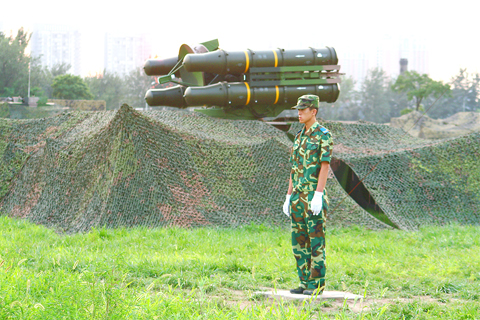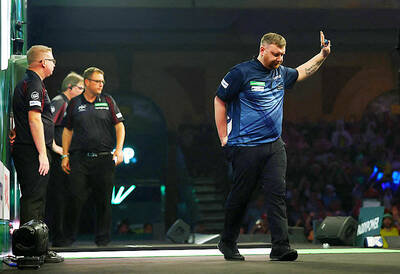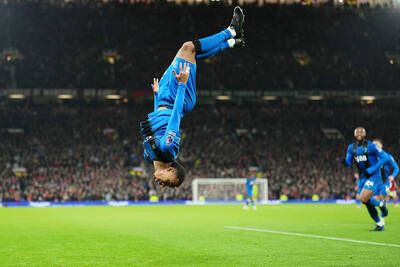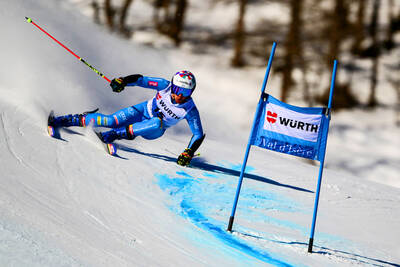A short walk from the National Stadium, near a busy coach station, there is a wire fence around a plot of land and a plain white sign with words in Mandarin and English that read: “Military Administrative District, No Admittance.”
It has become a tourist attraction of sorts, where both locals and foreigners gather to take shots of the guards standing to attention in front of a battery of missiles.
On a recent visit, it appeared the soldiers clad in military fatigues were controlling drones. They were fiddling with portable devices and looking heavenward, where a number of kites were also flying.

PHOTO: JOHN HANCOCK
While the idea of rocket launchers in such a built-up area is unsettling, it would be inconceivable for an Olympics to take place without a military presence of some sort.
This is especially true after Sept. 11, 2001, when terrorism redefined what was possible in terms of creating destruction. Greek Secretary General of Information Panos Livadas underlined this point on a visit to Beijing last week.
He said the Athens Games were the first after Sept. 11 and security costs were six times greater than had been anticipated because of it. It has set a precedent for all other Olympics, he added.
“Ours was the first Olympics to deal with this problem and that was one reason why there were delays [with our preparations]. Thank God there wasn’t an attack, but you have to be ready,” he said.
The authorities in Beijing keep reminding us of this. Earlier this week the director of security for the Games, Ma Zhenchuan (馬振川), said the East Turkistan Islamic Movement (ETIM) was targeting Olympic venues.
“It’s not imaginary. We have been focusing on the ETIM and it has been labeled a terrorist group not only by our country, but also the international community,” Ma told China Central Television.
At the beginning of the month security forces uprooted five “terrorist groups” that were preparing to launch attacks, and said that 82 people had been detained.
Additionally, state media claimed, more than 40 Islamist training bases were smashed.
The security clampdown is becoming increasingly evident as we count down to the big day. There are three security rings around Beijing and police cars patrol the intersections of major roads.
There are 40 anti-terrorism units in the capital and 110,000 security guards have been mobilized to keep the streets safe. About 300,000 surveillance cameras have also been deployed to keep track of suspicious behavior, while neighborhood watch teams are on guard.
During the subway rush hour bags are X-rayed and examined for suspect items, despite the inevitable delays. At bus terminals in far-flung provinces packages are examined if they are headed for the capital. Packs of dogs sniff around for trouble at Beijing Airport’s brand new Terminal 3.
“Safety first” seems to be the approach, and though some critics are saying this is a cover to crack down on dissent and is taking the fun out of the Games, Beijing has international support.
Interpol and more than 80 countries are involved in anti-terrorism measures for the Games, in conjunction with the International Olympic Committee, said Liu Shaowu (劉紹武), director of security for the Beijing Organizing Committee, on Wednesday.
“The common enemy of [the] international community is terrorists … so we have to upgrade the security level,” Liu said at the press conference. “We want to have both safety and festivity.”
If there is an incident the organizers will be blamed for not doing enough, so precautions are necessary.
Athens faced the same criticism four years ago and anti-terrorism measures in London 2012 will likely be even tighter. The price of security is inconvenience and missiles based downtown.
But there is little to suggest so far that this will be the “killjoy” Games that some news organizations are trying to depict.
On the contrary, as the crowd of tourists gawking at and photographing the missile installation suggests, “measured approach” seems a more accurate description.
“John Hancock” is the Taipei Times correspondent for the Beijing Olympics.
Also See: BEIJING OLYMPICS: China’s shuttlers won’t have it all their own way

By the time Cameron Menzies finally left the arena on Monday, the blood gushing from the gash on his right hand had trickled down his wrist, part of his forearm and — somehow — up to his face. Smeared in crimson and regret, and already mouthing sheepish apologies to the crowd, he disappeared down the steps, pursued by a stern-looking Matt Porter, the chief executive of Professional Darts Corp (PDC). The physical scars from Menzies’ encounter with the Alexandra Palace drinks table after his 3-2 defeat against Charlie Manby at the Darts World Championship would be gone within a few weeks.

Manchester United on Monday blew the lead three times to miss out on moving up to fifth in the Premier League as AFC Bournemouth would not be beaten in a thrilling 4-4 draw at Old Trafford. United have lost just once in their past 10 games, but Ruben Amorim would be frustrated as more points at home were frittered away despite arguably the best attacking display of his reign in charge. Amad Diallo and Casemiro gave the hosts a halftime lead either side of Antoine Semenyo’s equalizer. Two Bournemouth goals from Evanilson and Marcus Tavernier in seven minutes at the start of the

Italian Luca de Aliprandini described Saturday’s World Cup giant slalom at Val d’Isere as the hardest race of his life, coming two days after his Swiss partner Michelle Gisin suffered a heavy fall in training which required neck surgery. De Aliprandini finished 26th in the men’s event won by Loic Meillard, but the result paled into insignificance with two-time Olympic ski champion Gisin in hospital with injuries to her wrist, knee and cervical spine (neck). “It was Michelle’s wish that I race here. I couldn’t say no to her, but it was the toughest race of my entire life,” an emotional De

LOW-GOAL SHOOT-OUT: Of the nine penalties in the shoot-out, only three went in, with Flamengo’s Samuel Lino, and Vitinha and Nuno Mendes of PSG netting Matvei Safonov on Wednesday made four straight penalty saves in a penalty shoot-out to help Paris Saint-Germain beat Flamengo in the Intercontinental Cup final and win a sixth trophy of the year. The Russian goalkeeper was thrown in the air by his teammates after his exploits in the shoot-out, which was won 2-1 by PSG after a 1-1 draw after extra-time. It completed a trophy-laden 12 months for the French team, who had already won the Trophee des Champions, Ligue 1, the Coupe de France, the UEFA Champions League and the UEFA Super Cup — also on penalties against Tottenham Hotspur in